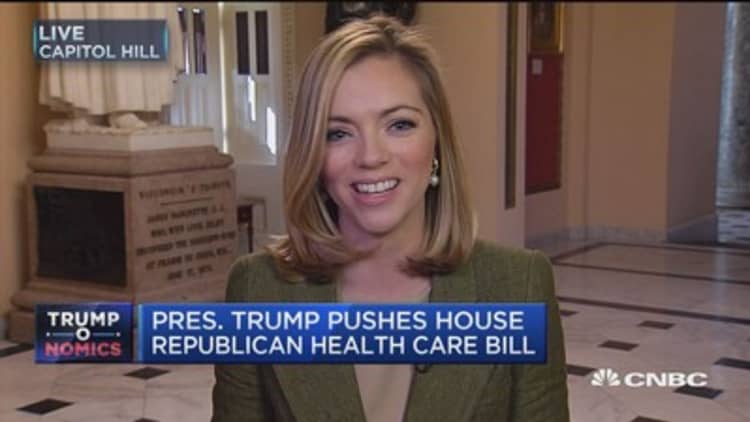
Freedom's just another word for something very big to lose.
The Republican bill to repeal and replace major parts of Obamacare was in dire straits Wednesday after the Trump administration failed to convince members of a key conservative group in the House of Representatives to support the bill.
Freedom Caucus Chairman Rep. Mark Meadows, R-N.C., said there that are still not enough GOP congressman on board to pass that bill in a full House vote Thursday, despite the White House heavily lobbying caucus members.
A Freedom Caucus spokeswoman said there are more than 25 members of that strongly conservative group who plan to vote "no" on the American Health Care Act.
That would be more than enough votes on their own to doom the bill — and there are other Republicans who do not belong to the caucus who also have qualms about the bill.
The spokeswoman for the group, which wants a more aggressive repeal of Obamacare, urged a "start over" of the legislative effort.
"If the vote were today, the bill would fail," said caucus member Rep. Mo Brooks, R-Ala.
Despite that, White House spokesman Sean Spicer said Wednesday, "the count keeps getting stronger for us."
"Member by member we keep seeing tremendous support flow in our direction," Spicer said at a news conference. "I'm optimistic in the sense of what we're seeing … and the amount of votes that are flowing our way and not the other way."
Freedom Caucus members have continued their negative views despite a full-court press from President Donald Trump and Republican congressional leaders to convince members of the group to back the American Health Care Act.
On Wednesday morning, caucus members listened to Vice President Mike Pence discuss "a couple of options" to win the support of the caucus for the bill, according to Meadows.
The bill will need 215 votes to pass — one fewer vote than had been expected because of the scheduled absence of a Democratic congressman who will be attending his wife's funeral. That means that in order to win passage, Republicans leaders cannot afford to lose more than 22 votes from members of the GOP caucus.
But more than 22 Republicans have publicly indicated that they will or likely will vote no on the bill.
Failure by the Trump administration and House Speaker Paul Ryan, R-Wis., to win passage of the bill, would be a stinging political loss.
Republicans hold not only the White House, but also both chambers of Congress, giving them their first real legislative chance in seven years to get rid of the Affordable Care Act, as the GOP has vowed to do for all of those years.
However, despite that widespread animosity toward Obamacare among Republicans, their effort to undo the law has run into deep trouble primarily because of people within the party.
Conservatives object to the current replacement bill because it maintains Obamacare's system, to a partial extent, of subsidizing the purchase of individual health insurance plans, and also would maintain for some time the coverage gains that have come from the expansion of Medicaid under the ACA.
Some moderate members of the GOP are worried about the projected loss of insurance among millions of people if the House bill becomes law. The Congressional Budget Office last week projected that 14 million more people would become uninsured next year under the bill than would be the case if Obamacare continued as is.
But 2026, a total of 24 million more people would be uninsured under the bill, than would be under Obamacare, the CBO estimated.
If Republicans are able to pass the bill out of the House, it may face even stronger opposition in the Senate, where the GOP holds just a two-seat majority.
A number of Republicans in the Senate have expressed concerns about the bill rolling back funding of Medicaid, its suspension of funding for Planned Parenthood, and the decrease in subsidies for many lower-income earners and older people to help buy their health plans.


